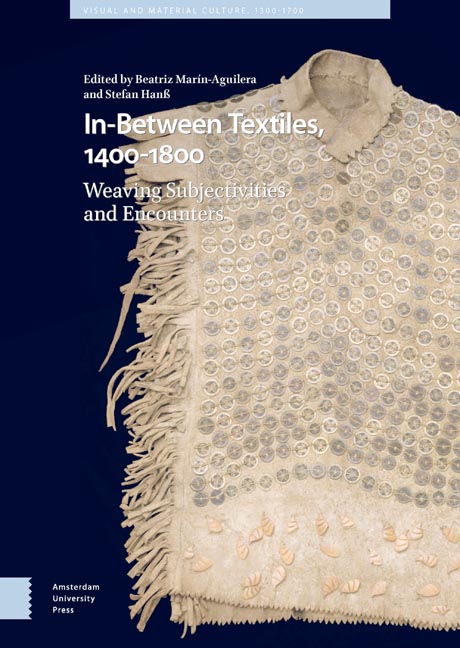Book contents
- Frontmatter
- Dedication
- Miscellaneous Frontmatter
- Table of Contents
- List of Illustrations
- Acknowledgements
- 1 Subjectivities In-Between Early Modern Global Textiles
- Part I Unhomeliness, Mimicry, and Mockery
- Part II The Material Enunciation of Difference
- Part III Identity Effects In-Between the Local and the Global
- Part IV Material Translation and Cultural Appropriation
- Archives, Libraries, and Museums (Abbreviations)
- Select Bibliography
- Index
9 - Globalising Iberian Moorishness: Japanese Visitors, Chinese Textiles, and Imperial Cultural Identity
Published online by Cambridge University Press: 14 October 2023
- Frontmatter
- Dedication
- Miscellaneous Frontmatter
- Table of Contents
- List of Illustrations
- Acknowledgements
- 1 Subjectivities In-Between Early Modern Global Textiles
- Part I Unhomeliness, Mimicry, and Mockery
- Part II The Material Enunciation of Difference
- Part III Identity Effects In-Between the Local and the Global
- Part IV Material Translation and Cultural Appropriation
- Archives, Libraries, and Museums (Abbreviations)
- Select Bibliography
- Index
Summary
Abstract
This chapter examines the role of textiles in the globally staged “game of canes,” an equestrian mock battle in which participants, dressed as “Moors,” throw spears at each other. More specifically, the chapter charts the role of textiles in establishing what Bhabha calls ambivalent “identity effects”—once textiles circulated across the Iberian world, and with them notions of imperial identities, the politics of identification themselves got dynamised within specific local settings. The use of textiles for the globalisation of Iberian notions of Moorishness, this chapter argues, produced conflicting “identity effects” on a local level.
Keywords: game of canes; racial regimes; identity politics; Spanish Empire
Introduction
A 1632 letter from Manila reports the organisation of festivals in celebration of the birth of prince Baltasar Carlos (1629–1646) emphasising that “there was a game of canes, which is no small feat in the Philippines.” The author of the letter praises the ability to preserve equestrian cultural practices originally from the metropolis in such a distant place, even if the conditions present were not ideal. Yet, of all similar instances coming from the margins of the Spanish Empire, the case of the Philippines is significant because this outpost, despite having difficulties in organising games of canes, actually had a dramatic impact on how aristocratic equestrian culture developed in the rest of the Spanish Empire. As this chapter will show, the Philippines was both the symbolic outpost of Spanish expansion toward East Asia and the main hub from which Chinese silks were exported for their use of Moorish clothing for the game of canes. It is in this material context, I argue, that Iberian Moorishness emerges as an ambivalent sign of cultural difference and identity, both within the Spanish Empire and in regard to its colonial experiences. As Homi Bhabha holds, “cultural difference is the process of the enunciation of culture as ‘knowledgeable,’ authoritative, adequate to the construction of systems of cultural identification. […] [C]ultural difference is a process of signification through which statements of culture or on culture differentiate, discriminate and authorize the production of fields of force, reference, applicability and capacity.”
- Type
- Chapter
- Information
- In-Between Textiles, 1400-1800Weaving Subjectivities and Encounters, pp. 205 - 218Publisher: Amsterdam University PressPrint publication year: 2023



